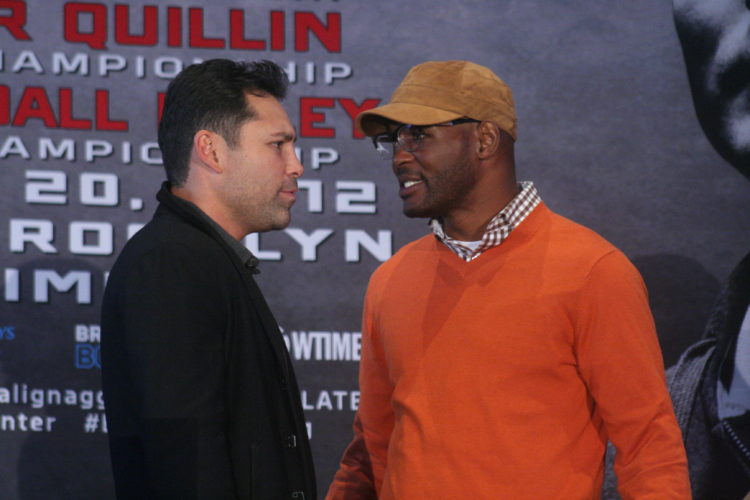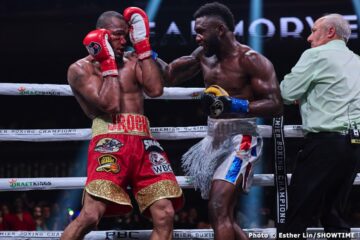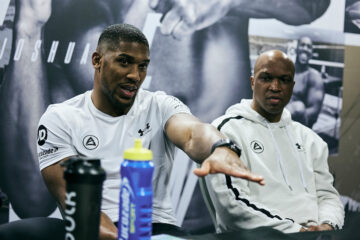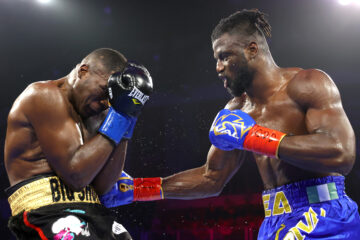THE BEGINNER’S GUIDE TO BERNARD HOPKINS B-HOP | BOXING BINGE-WATCH
Bernard Hopkins is a legend, a Hall-of-Famer, and one of the greatest boxers to ever live, let alone one of the five best middleweights ever, if not the best, that being said, his career spans for decades, and is not the easiest one to navigate or contextualize.
Hopkins finished his career with a record of 55 wins with 32 of those wins by way of knockout, 8 losses with only one being by way of knockout, and two draws.
Before this quarantine I respected Hopkins, I had watched the fights, most at the times they happened, but never gone back and watched the whole sum of his career, as the second installment in this series we will revisit Bernard Hopkins career, and provide insight as well as fights for people looking to get a context of Hopkins career, but not wanting to watch everything.
The Origin Story
Bernard Hopkins was born in Raymond Rosen Housing Projects in Philadelphia, Pa, and despite a promising amateur background in which he amassed roughly a hundred fights, Hopkins saw his chance at being an Olympian derailed as he was sentenced to prison for multiple felonies. Hopkins turned professional at 23-years-old after serving his sentence and being condescended by the warden who famously touted that he’d ‘…see [Hopkins] again soon.”
That statement would later serve as fight night fodder especially in the Tavoris Cloud, in which Max Kellerman would tell a short narrative about it.
As the hard-luck Philly fighter, who seemingly had nothing in his favor, losing his professional debut to Clinton Mitchell, a promising New York state amateur who saw diabetes derail his career, defeat Hopkins by majority decision.
Hopkins would be inactive for nearly two years before returning to the ring, and as with the boxing world, and the business side of things, with a loss already on his record Hopkins was more or less looked at as an opponent, based on his record, time off from being in the ring and his past limiting his ability to train in professional boxing gyms. Hopkins used that as motivation as he won 21 fights in a row, 16 of them by knockout, and 12 of which in the first round.
Hopkins had earned himself a shot at the vacant IBF middleweight title, but his challenger was 1988 U.S. Olympic silver medalist Roy Jones Jr, one of the best fighters of all-time, and at this time Jones was a bit too experienced for Hopkins outpointing him in a competitive, but decisive Jones victory, that was somewhat the start of Jones’ decade of dominance.
Years later, after Hopkins won his first world title he would recall this moment saying the following.
“I have been watching [Mike] Tyson and his first twenty fights as a professional, he ran through these guys and he didn’t give them a chance to let them know what they had and that’s what I am going back to, what I didn’t do with Roy Jones,” Hopkins said after his first world title win. “…Giving no respect!”
Hopkins would win four more bouts before having to fight Segundo Mercado in Mercado’s home country of Ecuador for the vacant IBF middleweight title. Not unlike most of Hopkins’ career, he was brought in as an opponent in a marquee fight to prop up a young fighter, but Hopkins fought him to a draw in a fight that saw Hopkins start aggressively, but then box Mercado who looked confused that Hopkins would deviate and have different tactics.
The first deep-dive binge-watching bout should entail the rematch between Bernard Hopkins and Segundo Mercado which took place at the US Air Arena in Landover, Maryland, as Hopkins dominated the bout, hurting Mercado badly in the fifth round and stopping him in the seventh. Hopkins was with Butch Lewis, as his promoter and Don King. Hopkins was an action fighter with a skillset that looked destined for stardom, with an iconic promotional duo behind him.
Hopkins would sue Butch Lewis (https://www.baltimoresun.com/news/bs-xpm-1999-02-06-9902060064-story.html), whom he accused of shortchanging him money for the Roy Jones Jr. fighter, and despite being a world champion began the unenviable position of moving through the pro ranks without a promoter, but a belt. So, Hopkins essentially had to stay active by fighting his mandatory opponents issued by the IBF.
One of the stand-out fights from this period would be his bout against then-undefeated middleweight Glen Johnson, who would go on to be a spoiler as well as a road warrior, hence Johnson’s nickname, also a man who knocked out Roy Jones Jr. Johnson known for a high guard and daunting pressure was overwhelmed by volume and angles as Hopkins was starting to come into his own at this point.
The Masterclass
Hopkins turned a corner in the Andrew Council bout, Council for those who might not know, was a big ol’ puncher who could lay a man out with a single shot and often put a ton of pressure on his opponents in order to be effective. In this bout, though Hopkins bullied him, outboxed, and displayed every trait a boxing trainer could want to see a fighter display in a prizefight. Though it might not be regarded as one of the “all-time” Hopkins fights based on the opponent, in terms of performance, beating Andrew Council in Council’s hometown is nothing short of a masterpiece. The bout displays every aspect of Hopkins’ greatness.
Hopkins would then define who he was more as he went into a contentious feud with Robert “Rock” Allen, in a bout in which Hopkins fell out the ring and the bout was called a no-contest in their first of three bouts. Allen didn’t take kindly to that.
“He bailed out,” Allen said to the Baltimore Sun’s Alan Goldstein. “He could have continued to fight. I think he just fell through the ropes and took a dive.”
As expected the rematch was highly anticipated and saw Hopkins transforming into the start of the character we know him now. As Allen entered the ring to a Westside Connection song, Hopkins entered somberly with two men wearing executioner masks as 2nd assist Brother Nazim Richardson said “It’s Execution Time”. Hopkins was not just a man earning respect anymore, he was a showman, who was bringing entertainment to world-class boxing in-and-out of the ring. Also important to note, Hopkins fought in trunks worn by Ray Robinson for this bout as well.
The Allen fight is also one of the bouts in which you would see aspects of the weird things that would happen in Hopkins bouts moving forward. Hopkins is a physical fighter, one who would take liberties if you held or got in close, a fight is a fight, and Hopkins was always willing to ref his own fight. Allen was hit low twice in the bout and went down dramatically, so much so that the announcer felt Allen was acting, Allen also fell down at the end of the round from a push from referee Rudy Battle, that made same say “WTF?”
Hopkins would stop Allen in the seventh round of this fight but then would refuse to stay in the ring to be interviewed or answer Jim Grey’s questions about the fight.
“…a lot of corruption in boxing and I am willing to take a stand as a champion,” said Hopkins wearing a Lugz hat which dates the interview to its era. “…How could I be in a sport, staying in the ring, let the hypocrites shower me with a belt and they take the fortune.”
Hopkins was becoming a star but didn’t have the dancing partner to get over the top and despite nearly a decade of dominance, the fact that he was still in the shadow of Roy Jones Jr., hung large. Hopkins would defeat Antwun Echols twice, a fighter from Davenport, Ia, who was tough but struggled with Hopkins. Allen and Echols are key fights to watch as their high-level fighters but relied on athletic traits over a boxing foundation at times, this got them into world fights and against the right opponent could’ve given them a world title win, but sadly for them, Hopkins knew how to exploit flaws and watching these bouts show a bit of preface to how Hopkins had such longevity in the sport.
The One Fight To Watch
Those younger than myself (lucky you) or those who have not watched boxing as long, might view Bernard Hopkins as a staple of the “going all 12-rounds club”, but up until this point, Hopkins was a feared puncher, who was viewed as highly aggressive to start fights, and feared for his pace and pressure, as his boxing skills were developing and starting to take shape in his past performances.
Don King put together a middleweight tournament featuring Keith Holmes, William Joppy, Bernard Hopkins and Felix “Tito” Trinidad, as a tournament to crown a champion of the division. For those in the know, it felt as though the tournament was set-up for “Tito” Trinidad to win the world title from all of the said champions of the division and be on his way to becoming a living legend, something he did regardless, but Hopkins made sure Trinidad’s legacy didn’t overlap his own.
After Hopkins antics with the Puerto Rican flag, a controversial tactic that to this day, is still not the most tasteful thing ever done, built up hype as well, as had Trinidad looking to punish Hopkins. What happened instead was a dominant Hopkins victory that saw Hopkins outbox Trinidad, bully and beat the smaller fighter, eventually stopping him in the twelfth and final round. Hopkins went from being a fighter with a world title fighting on USA network’s Tuesday Night Fights to headlining a pay-per-view fight as a massive underdog and still winning. It is a reoccurring theme of Hopkins career, the guy with a good resume being lead to slaughter to a “bigger name fighter” only to beat the name fighter.
Hopkins would return to action in his next bout against Oscar De La Hoya at a 156 lbs catchweight, De La Hoya coming off a controversial win over Felix Sturm and a win and a loss to Shane Mosley, faired well with Hopkins until Hopkins overpowered De La Hoya in the middle rounds and stopped him in the ninth round. De La Hoya who was urged by his trainer Floyd Mayweather Sr to use his jab saw the size of Hopkins influence the outcome when Hopkins went away from boxing in the early rounds, the fight changed.
Hopkins even stated to his corner after the eighth round heading into the ninth round that the following round was ‘…his round’. He was right, a left hook was all she wrote for De La Hoya, as Hopkins pulled off another major win.
Hopkins would make a defense over Harold Eastman before fighting Jermain Taylor, a young and emerging fighter that had burst on the scene. A contentious behind-the-scenes feud with Hopkins and Taylor’s promoter, Lou DiBella, took shape during this fight as Hopkins was suing DiBella at or around this time as well, and was vocal about how much he wanted to beat Taylor to prove a point to DiBella.
He didn’t. Taylor set the pace, which with Hopkins, especially as he hit his mid-30s was something he didn’t handle well as punch output was Hopkins kryptonite for the most part. The first Taylor fight was close, but Taylor seemed to throw just a tad bit more giving him the fight, The immediate rematch that followed was still close but felt like a decisive win for Taylor despite the 7-5 scorecards. It felt at this time, Hopkins had put together a legendary career, and that he was at the end of the road.
Hopkins streak was over as after defending the middleweight world title for 20 times over the course of one decade, Hopkins had lost, and this appeared to be the beginning of the end of his career.
The Rebirth
Hopkins fought Antonio Tarver, who was coming off filming “Rocky Balboa”, the boxing movie, playing fictional character Mason “The Line” Dixon. Tarver was taken to school as his weight did look to be an issue in the fight as he fatigued greatly against Hopkins in the second half of the fight, but part of the issue was Hopkins himself. Hopkins never gave Tarver anything to hit, and accumulated a lot of clean shots on Tarver that added up. At this point Hopkins career Brother Nazim Richardson had taken over the head coaching duties as Bouie Fisher and this problem one of the more iconic coach-to-fighter performances ever, in any fight.
It is important to note this bout took place at light heavyweight, as Hopkins moved up two weight classes, and the change as noted by legendary boxing coach, Emmanuel Stewart, looked to be the ideal weight for Hopkins at this point in his career.
Hopkins would face Ronald “Winky” Wright in his following bout, that was a battle of two legends a tidbit past their prime, but both beloved, creating a big name fight. The fight was a bit slow, and confusing, with the big takeaway being Winky Wright fighting in trunks that didn’t seem to fit him as well, as a tactical bout. Despite winning, and forgoing retirement after the Tarver fight, many doubted Hopkins could still compete against the young hungry stars of the division.
Hopkins would fight the hall-of-fame Welsh fighter Joe Calzaghe only to lose a split decision in a very close fight that saw Hopkins drop Calzaghe in the first round. Calzaghe’s high work rate was what the judges sided with, as the infamous quote made by Hopkins saying “he’d never lose to a whiteboy,” came back to bit him in the end.
Enter Kelly Pavlik
Hopkins now believed to be at the end of his career, and losing to Joe Calzaghe was viewed as the past, and Top Rank Inc’s surging future American star, Kelly Pavlik, was next up for him. The bout was on pay-per-view, and many, if not most, viewed this as Pavlik’s arrival as a superstar. Instead, it was one of the career-defining moments of Hopkins career, as most doubted him, he battered, beat, and outclassed Pavlik, who looked confused and at a loss for words when the fight was over.
“You don’t have a heart if you can’t be inspired by B-Hop” said modern Philadelphia world champion Julian “J-Rock Williams when asked about Hopkins. Williams also pointed out that Hopkins created a chain-reaction of world champions that saw Steve Cunningham, Danny Garcia, himself [Julian Williams], and Tevin Farmer, all from Philly.
Hopkins would defend his belt one time before avenging his loss to Roy Jones Jr in 2010 on pay-per-view. The bout was not hotly anticipated as Roy Jones Jr had lost to Danny Green in Australia in one-round tune-up bout that went all wrong. The bout was simply one for the record book, but like a lot of rematches, and such of past prime fighters, we might remember the win over the big name, but will forget the fight altogether.
Hopkins attempted to best George Foreman’s record of becoming the oldest world champion, Foreman was 45-years-old when he beat Michael Moorer, as he fought Jean Pascal, the man who defeated light heavyweight boogeyman, “Bad” Chad Dawson.
The first Pascal bout saw Hopkins dropped in the first round, only to rally back and seemingly win the bout, albeit it was very close, but only to find out the bout was ruled a draw. The two would do battle again, as Hopkins would defeat Pascal in the rematch in Pascal’s native turf, north of the border in Canada.
Old Man B-Hop
After a decade of dominance, multiple upset victories, and now the oldest world champion ever, Hopkins was a living legend in the sport of boxing. Hopkins’ first title defense of the WBC light heavyweight title was against one of the most avoided fighters in the division, Chad Dawson.
The two fought twice, and the first bout was similar to the first bout Hopkins had with Robert “Rock” Allen as a Hopkins would be thrown in the bout and unable to continue. Dawson was originally announced the winner, but it was later labeled a no-contest, this set the stage for the rematch.
The rematch was a highly competitive fight, but saw the younger Dawson being able to throw a bit more and also being a bit quicker than Hopkins as Dawson picked up the win over Hopkins.
Hopkins would face IBF light heavyweight world champion Tavoris Cloud, who was promoted by Hopkins old promoter and foe Don King. Hopkins would win the world title at 48-years-old, making him the oldest world champion ever, though the bout as with most of Hopkins older bouts was more tactical using experience to defeat a fighter relying upon physical gifts.
Hopkins would make two title defenses against mandatory opponents Karo Murat and Beibut Shumenov. Neither fight is a masterpiece or an example of prime Hopkins, but both show the level of skill Hopkins had in order to fight at such an advanced age. The Shumenov fight is his last recorded professional win, and is one worth revisiting in part, as it is historic.
The B-Hop Curse
Hopkins faced the best light heavyweight at that moment, Sergey Kovalev, and lost a one-sided decision that got scary late in the fight, as the beloved Hopkins was getting hit a lot, and Kovalev is a quintessential puncher, who his power lead to a man passing away from injuries inflicted after a fight.
That being said, the fighters who beat Hopkins in the modern era, Jermain Taylor, Chad Dawson, and Sergey Kovalev all saw their careers go in weird downward trajectories after beating Hopkins despite beating a future hall-of-famer, as none of them are shoo-ins hall-of-fame.
Taylor lost to Pavlik and then floundered in the Super Six middleweight tournament, Dawson was stopped by Andre Ward only to be knockout by Adonis Stevenson in one round following and Sergey Kovalev would get stopped by Andre Ward, stopped by Eleider Alvarez and eventually put on the knockout highlight reel of Canelo Alvarez. Sure, that is boxing, but most fighters surging upward, don’t tend to have that dramatic decline.
When watching these bouts with my mom, years back, I remember her making a great point that Hopkins puts a lot of mental pressure on opponents, from the way he looks at you, talks to you, the interactions Hopkins does in and out of the fight, wear on you if you were to fight him. Something about Hopkins lingers in his opponents, even after the bout, but it isn’t tangible, it is something dormant and silent, that you have to be aware of, but even then, still are not immune to it.
I have left out his last loss which was to Star Boxing’s Joe Smith Jr., in which Hopkins was knocked out of the ring, and the fight just felt scary at the end and somewhat sad. The notable thing of this fight is matchmaker Ron Katz gave Hopkins his first loss, and his last loss as he put together both bouts that started and ended Hopkins career.
Hopkins’ Legacy and Importance
Bernard Hopkins is the story of change, but also one of speaking from your heart. I am as different in many ways from Bernard Hopkins in terms of how I look, religion and I am sure on various issues, but the fact that he spoke with his heart and honestly, I think most people related to him, because he was sincere.
Hopkins will be remembered as one of the most dominant middleweights ever, who never got his due during his era and a fighter who could not just be thrown to the wayside by promoters looking to use his name to build up a young fighter. Hopkins is a legend, who played by his own rules and mastered the art of boxing, training, and mental warfare.
Hopkins held seven world titles between two divisions, middleweight, and light heavyweight with a record of 24-5-2, 2NC (13 KOs) in world title fights.






